- Home
- Paulo Coelho
The Winner Stands Alone Page 17
The Winner Stands Alone Read online
Page 17
The people on the terrace have clearly leaped over certain barriers already; they are not outside with the photographers, behind the metal barriers, waiting for someone to come out of the main door and fill their universe with light. They have already made it into the hotel lobby, and now all they need is fame and power, and they really don't mind what form these take. Men know that age isn't a problem, all they need are the right contacts. The young women--who keep as keen an eye on the terrace as any trained bodyguard--know that they're reaching a dangerous age, when any chance of achieving something through their beauty alone will suddenly vanish. The older women there would like to be recognized and respected for their gifts and their intelligence, but the diamonds they're wearing make it unlikely that their talents will be discovered. The men sitting with their wives are waiting for someone to pass by and say hello and for everyone to turn and look and think: "He must be well-known, or even famous, who knows?"
The celebrity syndrome. It can destroy careers, marriages, and Christian values, and can blind both the wise and the ignorant. A few examples. Great scientists who, on being given an important prize, abandon the research that might have helped humanity and decide instead to live off lectures that feed both their ego and their bank balance. The Indian in the Amazon jungle who, on being taken up by a famous singer, decides that he's being exploited for his poverty. The campaigner for justice who works hard defending the rights of the less fortunate, decides to run for public office, wins the election, and subsequently considers himself above the law, until he's discovered one day in a motel room with a prostitute paid for by the taxpayer.
The celebrity syndrome. When people forget who they are and start to believe what other people say about them. The Superclass, everyone's dream, a world without shadows or darkness, where yes is the only possible answer to any request.
Igor is a powerful man. He has fought all his life to get where he is now. To that end, he has sat through boring suppers, endless lectures, and meetings with people he loathed, has bestowed smiles when he would rather have bestowed insults, and insults when he actually felt genuinely sorry for the poor creatures being singled out for punishment, as an example to others. He worked day and night and weekends too, deep in discussions with lawyers, administrators, officials, and press officers. He started with nothing just after the fall of the Communist regime and he reached the top. He has, moreover, managed to survive all the political and economic storms that swept his country during the first two decades of the new regime. And why? Because he fears God and knows that the road he has traveled in his life is a blessing that must be respected; if not, he will lose everything.
There were, of course, moments when something told him he was forgetting about the most important part of that blessing: Ewa; but for many years he persuaded himself that she would understand and accept that it was simply a temporary phase and that soon they would be able to spend as much time together as they wished. They made great plans--journeys, cruises, a remote house in the mountains with a blazing log fire, and the certain knowledge that they could stay there for as long as they wanted, with no need to worry about money, debts, or obligations. They would find a school for the many children they planned to have together; they would spend whole afternoons walking through the surrounding forests; they would have supper at small, cozy local restaurants.
They would have time to garden, read, go to the cinema, and do the simple things that everyone dreams of doing, the only things truly capable of filling anyone's life. When he got home, his arms full of papers which he would then spread out on the bed, he would ask her to be patient for a little while longer. When his phone rang on the very day they'd chosen to go out to supper together, and he had to interrupt their conversation and spend a long time talking to whoever had called, he would again ask her to be patient. He knew Ewa was doing everything she could to make things easy for him, although she did complain now and then, very sweetly, that they needed to make the most of life while they were still young; after all, they had money enough for the next five generations.
Igor would say: "Right, I'll stop today." And Ewa would smile and stroke his cheek, and then he would remember something important he'd forgotten to do and go over to the phone to ring someone or to the computer to send an e-mail.
A MAN IN HIS FORTIES gets up, looks around the terrace, and, brandishing a newspaper, shouts:
"'Violence and horror in Tokyo' says the headline. 'Seven people killed in a shop selling electronic toys.'"
Everyone looks at him.
"Violence! They don't know what they're talking about. This is where you get real violence!"
A shudder runs down Igor's spine.
"If some madman stabs to death a few innocent people, the whole world is shocked, but who cares about the intellectual violence being perpetrated in Cannes? Our festival is being killed in the name of a dictatorship. It's not a question of choosing the best film, but of committing crimes against humanity, forcing people to buy products they don't want, putting fashion above art, choosing to go to a lunch or a supper rather than watch a film. That's disgraceful. I'm here to--"
"Be quiet," someone says. "No one cares why you're here."
"I'm here to denounce the enslavement of man's desires, for we have stopped using our intelligence to make choices and instead allow ourselves to be manipulated by propaganda and lies! People get all steamed up about these stabbings in Tokyo, but they don't give a damn about the death by a thousand cuts suffered by a whole generation of filmmakers."
The man pauses, expecting a standing ovation, but there isn't even a thoughtful silence. Everyone resumes their conversations, indifferent to his words. He sits down again, trying to look dignified, but with his heart in shreds for making such a fool of himself.
"VIS-I-BIL-I-TY," THINKS IGOR. "THE PROBLEM is that no one took any notice."
It's his turn to look around. Ewa is staying at the same hotel, and a sixth sense born of many years of marriage tells him that she's sitting not very far away on that same terrace. She will have received his messages and is probably looking for him now, knowing that he, too, must be near.
He can't see her, but neither can he stop thinking about her--his obsession. He remembers one night being driven home in his imported limousine by the chauffeur who doubled as his bodyguard--they had fought together in Afghanistan, but fortune had smiled on them in very different ways--and remembers asking the driver to stop outside the Hotel Kempinski. He left his mobile phone and his papers in the car and went up to the terrace bar. Unlike this terrace in Cannes, the place was almost empty and getting ready to close. He gave a generous tip to the waiters and asked them to stay open for another hour, just for him.
And that was when he understood. It wasn't true that he would give up work next month or next year or even next decade. They would never have the house in the country and the children they dreamed of. He asked himself that night why this was impossible and he had only one answer.
On the road to power, there's no turning back. He would be an eternal slave to the road he'd chosen, and if he did ever realize his dream of abandoning everything, he would plunge immediately into a deep depression.
Why was he like that? Was it because of the nightmares he had about the trenches, remembering the frightened young man he'd been then, fulfilling a duty he hadn't chosen and being forced to kill? Was it because he couldn't forget his first victim, a peasant who had strayed into the line of fire when the Red Army was fighting the Afghan guerrillas? Was it because of the many people who hadn't believed in him and had humiliated him when he was looking for investors for his mobile phone business? Was it because in the beginning he'd had to associate with shadows, with the Russian mafia eager to launder the money they earned through prostitution?
He'd managed to repay those questionable loans without himself being corrupted and without owing any favors. He'd managed to negotiate with the shadows and still keep his own light burning. He knew that the war belonged to the di
stant past and that he would never again set foot on a battlefield. He'd found the love of his life. He was doing the kind of work he'd always wanted to do. He was rich, very rich, and, just in case the Communist regime were to return tomorrow, he kept most of his personal fortune abroad. He was on good terms with all the political parties. He'd met famous people from around the world. He'd set up a foundation to care for the orphans of those soldiers killed during the Soviet invasion of Afghanistan.
But it was only when he was sitting on that terrace cafe near Red Square, knowing that he had power and money enough to pay the waiters to work all night if necessary, that he finally understood.
He understood because he saw the same thing happening to his wife. Ewa was also constantly traveling, and even when she was in Moscow, she would arrive home late and go straight to her computer as soon as she walked in the door. He understood that, contrary to what most people think, total power means total slavery. When you get that far, you don't ever want to give it up. There's always a new mountain to climb. There's always a competitor to be convinced or crushed. Along with two thousand other people, he formed part of the most exclusive club in the world, which met only once a year in Davos in Switzerland, at the World Economic Forum. All the members were millionaires, and they all worked from dawn until late at night, always wanting to go further, never changing tack--acquisitions, stock markets, market trends, money, money, money. They worked not because they needed to, but because they judged themselves to be necessary; they felt that thousands of families depended on them and that they had a huge responsibility to their governments and their associates. They genuinely thought they were helping the world, which might be true, but they had to pay for this with their own lives.
THE FOLLOWING DAY, HE DID something he hated having to do: he went to a psychiatrist. Something must be wrong. He discovered then that he was suffering from an illness that was fairly common among those who had achieved something beyond the grasp of ordinary folk. He was a compulsive worker, a workaholic. According to the psychiatrist, workaholics run the risk of becoming depressed when not immersed in the challenges and problems of running a company.
"We don't yet know the origin of the disorder, but it's associated with insecurity, childhood fears, and a desire to block out reality. It's as serious an addiction as drugs. Unlike drugs, however, which diminish productivity, the workaholic makes a great contribution to the wealth of his country. So it's in no one's interests to seek a cure."
"And what are the consequences?"
"You should know, because that's presumably why you've come to see me. The gravest consequence is the damage it causes to family life. In Japan, one of the countries where the illness is most common and where the consequences are sometimes fatal, they've developed various ways of controlling the obsession."
Igor couldn't remember listening to anyone in the last two years with the respect and attention he was paying that bespectacled, mustachioed man before him.
"So there is a way out, then?"
"When a workaholic seeks help from a psychiatrist that means he's ready to be cured. Only about one in every thousand cases realizes that he needs help."
"Oh, I need help, and I have enough money..."
"That's what all workaholics say. Yes, I know you have enough money, you all do. I know who you are as well. I've seen photos of you at charity balls, at congresses, in private audience with our president, who, by the way, shows the same symptoms. Money isn't enough. What I want to know is this: do you really want to change?"
Igor thought of Ewa, of the house in the mountains, the family he'd like to have, the hundreds of millions of dollars he had in the bank. He thought of his position in society and of the power he possessed and how difficult it would be to give all that up.
"I'm not saying you should abandon what you're doing," said the psychiatrist, as if he'd read his thoughts. "I'm simply suggesting that you use work as a source of happiness and not as a compulsion."
"Yes, I can do that."
"And what would be your main motive for doing so? All workaholics think they're happy doing what they're doing, and none of their friends, who are in the same position, will see why they should seek help."
Igor lowered his eyes.
"Shall I tell you what your main motive is? As I said before, you're destroying your family."
"No, it's worse than that. My wife is starting to show the same symptoms. She's been distancing herself from me ever since a trip we made to Lake Baikal. And if there's anyone in the world I would be capable of killing again for..."
Igor realized he'd said too much, but the psychiatrist seemed entirely unmoved.
"If there's anyone in the world for whom I would do anything, absolutely anything, that person is my wife."
The psychiatrist summoned his assistant and asked her to make a series of appointments. He didn't consult his patient to see if he would be available on those dates; it was part of the treatment to make it quite clear that any other commitment, however important, could be postponed.
"May I ask a question?"
The psychiatrist nodded.
"Couldn't overwork also be considered rather noble? A proof of my deep respect for the opportunities God has given me in this life? A way of putting society to rights, even if sometimes I have to use methods that are a little..."
Silence.
"A little what?"
"Oh, nothing."
Igor left the consulting room feeling both confused and relieved. Perhaps the psychiatrist had failed to understand the essence of what he did. Life has its reasons. We are all of us linked, and often it's necessary to cut out the malignant tumors so that the rest of the body can remain healthy. People are locked up in their selfish little worlds; they make plans that don't include their fellow man; they believe the planet is simply land to be exploited; they follow their instincts and desires and care nothing for the collective well-being of society.
He wasn't destroying his family, he simply wanted to leave the world a better place for the children he dreamed of having, a world without drugs or wars or people trafficking, a world in which love would be the great force uniting all couples, peoples, nations, and religions. Ewa would understand this, even if their marriage was currently going through a crisis, a crisis doubtless sent by the Evil One.
The following day, he asked his secretary to cancel all subsequent appointments with the psychiatrist; he had more important things to do. He was drawing up a great plan to purify the world, a plan for which he would need help; indeed, he'd already contacted a group prepared to work with him.
Two months later, the wife he loved left him--because of the Evil that had possessed her, because he hadn't been able to understand her feelings.
THE SOUND OF A CHAIR being shifted returns him to the reality of Cannes. Before him sits a woman holding a glass of whisky in one hand and a cigarette in the other. She's well-dressed but visibly drunk.
"May I sit here? All the other tables are occupied."
"You already are sitting here."
"It's just not possible," says the woman, as if she'd known him for years. "It's simply not possible. The police made me leave the hospital. And the man for whose sake I traveled by train for almost a whole day, for whom I rented a hotel room at twice the normal price, is now hovering between life and death. Damn!"
Is she from the police? Or does what she's saying have nothing to do with what he thinks it does?
"Anyway, what are you doing here, if you don't mind my asking? Aren't you hot? Wouldn't you be cooler without your jacket on, or are you trying to impress everyone with your elegance?"
As usual, people choose their own destiny, and this woman is doing just that.
"I always wear a jacket regardless of the temperature. Are you an actress?"
The woman gives an almost hysterical laugh.
"Yes, let's say I'm an actress, yes I am. I'm playing the part of someone who has had the same dream since she was an adolescent, has grown
up with it, battled seven miserable years of her life to make it a reality, who's mortgaged her house, worked ceaselessly..."
"Oh, I know what that's like."
"No, you don't. It means thinking about just one thing day and night, going to places uninvited, shaking hands with people you despise, phoning once, twice, ten times until you get the attention of people who aren't worth half what you are, who don't have half your courage, but who've reached a certain position and are determined to take out on you all their domestic frustrations by making your life impossible..."
"...it means only finding pleasure in pursuing your dream, having no other diversions, finding everything else deadly dull, and ending up destroying your family."
The woman looks at him, taken aback. She no longer seems drunk.
"Who are you? How do you know what I'm thinking?"
"I was thinking about exactly the same thing when you arrived. And I don't in the least mind you asking me what I'm doing here. I think I can help you."
"No one can help me. The only person who could is now in the intensive care unit. And from what I could glean before the police arrived, he probably won't survive. Oh God!"
She drinks the remaining whisky in her glass. Igor signals to the waiter, who ignores him and goes to serve another table.
"I've always preferred a cynical compliment to a bit of constructive criticism. Please, tell me I'm beautiful and that I've got what it takes."
Igor laughs.
"How do you know I can't help you?"
"Are you by any chance a film distributor? Do you have contacts and a chain of cinemas around the world?"

 The Alchemist
The Alchemist Maktub
Maktub Like the Flowing River
Like the Flowing River The Winner Stands Alone
The Winner Stands Alone The Spy
The Spy By the River Piedra I Sat Down and Wept: A Novel of Forgiveness
By the River Piedra I Sat Down and Wept: A Novel of Forgiveness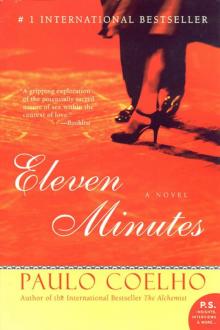 Eleven Minutes
Eleven Minutes Manuscript Found in Accra
Manuscript Found in Accra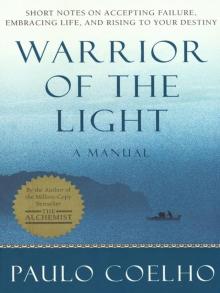 Warrior of the Light
Warrior of the Light Veronika Decides to Die: A Novel of Redemption
Veronika Decides to Die: A Novel of Redemption The Devil and Miss Prym: A Novel of Temptation
The Devil and Miss Prym: A Novel of Temptation The Valkyries: An Encounter With Angels
The Valkyries: An Encounter With Angels Brida: A Novel
Brida: A Novel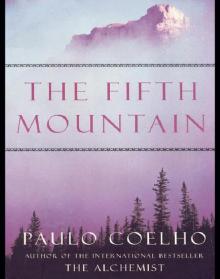 Fifth Mountain: A Novel
Fifth Mountain: A Novel Adultery
Adultery Inspirations
Inspirations The Archer
The Archer The Witch of Portobello
The Witch of Portobello The Pilgrimage
The Pilgrimage The Zahir
The Zahir Brida
Brida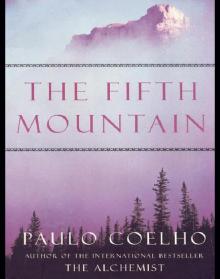 The Fifth Mountain
The Fifth Mountain Like the Flowing River: Thoughts and Reflections
Like the Flowing River: Thoughts and Reflections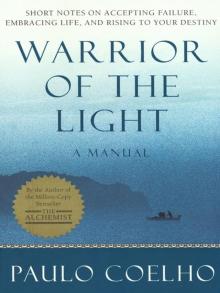 Manual of the Warrior of Light
Manual of the Warrior of Light By The River Piedra I Sat Down & Wept
By The River Piedra I Sat Down & Wept The Supreme Gift
The Supreme Gift Aleph
Aleph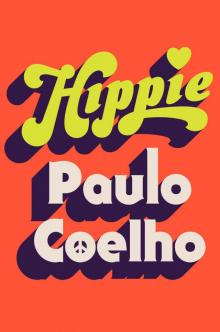 Hippie
Hippie Witch of Portobello
Witch of Portobello The Devil and Miss Prym
The Devil and Miss Prym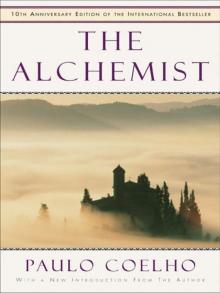 The Alchemist - 10th Anniversary Edition
The Alchemist - 10th Anniversary Edition The Valkyries
The Valkyries